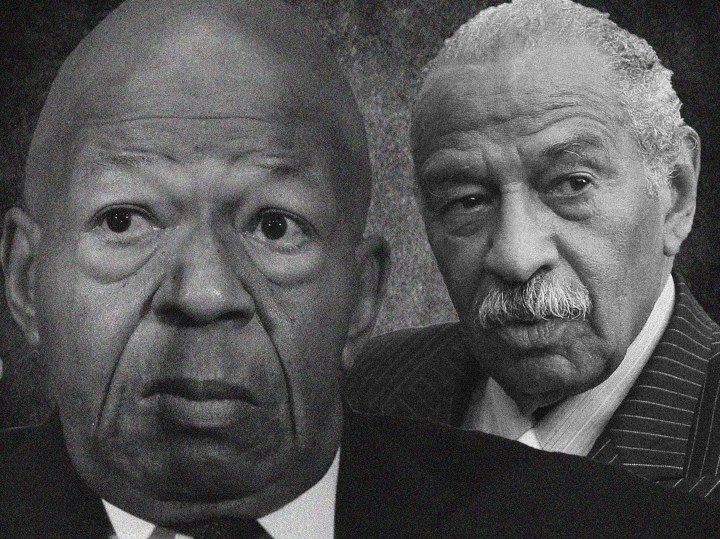IN MEMORIAM
US Congressmen John Conyers and Elijah Cummings: The legacies and trajectories of power

At a time when Washington is transfixed by an impending impeachment vote over Donald Trump’s fitness for office, it can be useful to pause to consider the often parallel careers of two influential African-American congressmen who have just died.
Within just days of each other, former longtime Congressman John Conyers and incumbent Congressman Elijah Cummings died, their differing trajectories representative of some of the best (and some not so) of contemporary US political life – even as they occupied front seats for many of the major political events of our time.
John Conyers, the longest-serving African-American congressman in US history, died on 27 October. He had served in Congress from a district encompassing Detroit and its suburbs from 1965 until his resignation in 2017, in the wake of sexual harassment charges.
Over the years, Conyers had burnished a reputation as one of the most influential liberal/progressive forces on Capitol Hill. Back in 1988, Conyers told an interviewer:
“I was always drawn to the struggle because my dad was a labour organiser for the UAW [the United Automobile Workers’ union]. Well, he had been in the labour movement at Chrysler, in the auto plants, even before the UAW, where it was illegal to be in unions, and you had to wear your button on your underwear under your shirt, where you would get beat up, and thrown out, you’d get beat up before you got fired, for trying to form a union, so I came up in that kind of environment… He retired as an international representative for UAW. So I always had a political view, and the civil rights movement, of course, was electrifying.”
Conyers had represented a Michigan district that included much of Detroit (and, more recently, parts of the city’s suburban areas as the city itself lost a chunk of population and as the state’s congressional districts were successively redrawn over the years). Conyers’ service included the time when the nation’s automobile manufacturing industry had suffered greatly, leading Conyers’ home-town to head into a sharp economic dive. For decades, Conyers had – together with another Michigan congressman, John Dingell Jr, who also died recently – given their state a massive footprint on Capitol Hill, and thus on national politics in the debates and negotiations over most proposed legislation. During his service in Congress, Conyers had eventually become chairman of the House Oversight Committee and then, later, the House Judiciary Committee.
Back in 1969, Conyers had also been one of the co-founders of the Congressional Black Caucus, now a powerful grouping within the larger framework of congressional membership. Interestingly, one of the members of the recently elected group of four congresswomen, “The Squad”, Rashida Tlaib, now occupies Conyers’ old congressional seat. When she learned of his passing, she tweeted, “Our Congressman forever, John Conyers, Jr. He never once wavered in fighting for jobs, justice and peace. We always knew where he stood on issues of equality and civil rights in the fight for the people. Thank you Congressman Conyers for fighting for us for over 50 years.”
Conyers was born in 1929, grew up in Detroit and attended home-town Wayne State University for undergraduate and law degrees. During the Korean War, he served in a unit of African-American combat engineers. Returning to civilian life, he became a civil rights activist, taking part in voting rights efforts in Selma, Alabama back in the early 1960s. He later became an aide to then-Congressman John Dingell, until he ran for Congress himself in 1964, following the redistricting of the state that had created a Detroit-based district with no incumbent – as a result of the Supreme Court’s voting rights decision (Baker v Carr) that made it unconstitutional to create districts designed to under-represent minority voters.
When Conyers won that election, Ebony magazine wrote: “He vowed to represent people who are caught between the VIP class of Negro life and the lower class which is dependent on relief, low-income housing, and welfare.” In yet another interesting coincidence in Conyers’ life, one of his early political supporters had been Rosa Parks, the same woman whose arrest in Montgomery, Alabama in 1955 over segregated bus seats launched the bus boycott in Montgomery, the events that helped spark the US civil rights revolution. Thereafter, when she had been unable to find a job, like so many hundreds of thousands of other African Americans, she migrated north to Detroit.
Reminiscing about his initial election, Conyers said, “If it wasn’t for Rosa Parks, I never would have gotten elected.” Following Conyers’ election, he hired Parks for his congressional staff and she stayed on staff until retiring in 1988.
Conyers was a frequent thorn in the paws of Republican presidents throughout the years he served in Congress. In fact, Richard Nixon put Conyers on his enemies list, along with actor Paul Newman and journalist Daniel Schorr, among others. In 1972, Conyers introduced a resolution in Congress to call for Nixon’s removal from office over his (mis) handling of the Vietnam War. From time to time, he also gave vent to his ire against Democratic presidents, calling Jimmy Carter “hopeless” and “demented”, and engaging in a public snit with Barack Obama. One longtime Democratic strategist observed of that particular fight:
“Conyers has been in Congress longer than Barack Obama could spell. If he’s making a complaint, it’s a shot across the bow, and you might want to pay attention to that.”
Through his career, Conyers strongly supported gun control, anti-poverty programmes and universal healthcare – and, in fact, had earlier introduced legislation that would have produced a version of what is now being called “medicare for all”. In his time, he also convened congressional hearings on racialised police misconduct and he supported legislation to study paying reparations to the descendants of slaves, an idea that is again getting public attention.
As Conyers said, “Over four million Africans and their descendants were enslaved in the United States and its colonies from 1619 to 1865, and as a result, the United States was able to begin its grand place as the most prosperous country in the free world.”
Conyers was also the father of the Martin Luther King Day commemorative holiday. Within days of the civil rights figure’s death, Conyers introduced a congressional resolution to establish the holiday. While it took 15 years to win the battle, Conyers persisted. The Rev Jesse Jackson said after Conyers’ own death, “He [Conyers] single-handedly fought for a King holiday. He led the groundwork. He is the reason for the #DrKing holiday.”
Eventually, however, scandals began to encroach on his political invulnerability. He failed twice in his bid to become Detroit’s mayor, and his wife pleaded guilty to bribery charges in 2009. Then in 2017, reports surfaced that he had settled a sexual harassment lawsuit with a staff member years earlier. Reports of other misconduct allegations increased the pressure, and he stepped down in December 2017.
When Conyers surrendered, Politico’s Zack Stanton wrote, “It is an ignoble and overdue end to what has been, by any measure, a momentous public life. Conyers’ service in Congress has spanned 10 presidencies and 52 years — he’s been in the House for more than one-fifth of the entire existence of the US Congress. In 1964, he went to Jim Crow Mississippi during Freedom Summer and offered legal representation to black voting-rights activists; one year later, he supported the Voting Rights Act as a member of the House of Representatives. He was the only congressman ever endorsed by Martin Luther King Jr.”
***
At age 68, Congressman Elijah Cummings died after a period of ill health, on 17 October. He was a veteran congressman who for years had represented the city of Baltimore, Maryland, as well as some of the city’s suburbs as Maryland’s congressional districts. In 2019, Cummings found himself in a war of words with Donald Trump, stemming largely from the fact that the president was the subject of investigations led by Cummings, now in his role as chairman of the House Committee on Oversight and Government Reform.
At his passing, Cummings’ committee had aggressively been taking on the proposed addition of a citizenship question to the upcoming 2020 US census (presumably aimed at keeping the count of undocumented aliens down and thus affecting state congressional redistricting as well as federal payments for many projects); the use of private email by various Trump officials and the president’s family; the actions of former Trump lawyer Michael Cohen; and, most potently, the ill-treatment of all those crowds of would-be migrants on the Mexican border.
In return, Trump had attacked Cummings via Twitter, accusing him of playing “the race card”, and calling Cummings’ Baltimore a city unfit to live in, saying it was a “rat and rodent-infested mess where no human being would want to live”. In fact, rather than the horrid caricature of urban blight as described by Trump, Cummings’s district includes mixed city neighbourhoods undergoing gentrification, as well as sizeable bits of suburban Baltimore County and adjoining Howard County.
Unfazed by the presidential tantrum, Cummings responded that he went “home to my district daily. Each morning I wake up and I go out and fight for my neighbours,” and he then encouraged the president to compare Cummings’ own district to the one in South Carolina previously represented by the Trump ally Mick Mulvaney – until he had been brought into the Trump administration. The numbers on Mulvaney’s district actually show it was poorer and the population was far less educated than the one in Baltimore. The media, meanwhile, noted that a big chunk of the less than salutary rental property in Cummings’s district was actually owned by companies controlled by Trump’s son-in-law, Jared Kushner.
In a speech a few weeks later, Cummings said of all this, “Those at the highest levels of government must stop invoking fear, using racist language, and encouraging reprehensible behaviour. As a country, we must say ‘enough is enough’, that we are done with hateful rhetoric.”
Still, while Cummings had tackled the president harshly, he also had a history of trying to cool racial taunts and violence. During the hearings on Michael Cohen, Cummings publicly stood up for arch-conservative Republican congressman Mark Meadows, who had been accused of racism in his committee hearing questioning. Cummings called him “one of my best friends”. Four years earlier, he had delivered the eulogy at the funeral of Freddie Gray, a black man killed in police custody in Baltimore. And when violence had spread through Baltimore’s inner city, Cummings himself patrolled the streets holding a hand-held megaphone, asking residents to obey a police curfew, and telling them “I’d die for my people.”
Speaking at the 2016 Democratic presidential nominating national convention, Cummings spoke of a new civil rights movement, saying, “our party does not just believe, but understands, that Black Lives Matter. But we also recognise that our community and our law enforcement work best when they work together.”
Cummings was born in Baltimore, the son of sharecroppers in South Carolina before they too, like so many thousands more, also moved north to Maryland as part of “The Great Migration”. While his parents had been uneducated labourers, they were also preachers, and his mother founded the Victory Prayer chapel in Baltimore, a congregation that became a bulwark of the civil rights struggle. Elijah Cummings grew up in a segregated city and he could recall being physically attacked as a child when black people first tried to use a swimming pool in a white area of the city. He recalled his mother had told him while on her deathbed, “Do not let them take our votes away.”
His parents pushed Cummings to get an education. He went to Howard University (one of the leading historically black universities in the country) and then to the University of Maryland for a law degree. In his early electoral races, he became a member of the Maryland House of Delegates (the state legislature), becoming the state legislature’s first black speaker pro tempore. In 1996, he was elected to Congress in a special election, when then-Congressman Kweisi Mfume resigned to become head of the National Association for the Advancement of Colored People. Cummings won his election with 81% of the vote, and he was re-elected 12 more times, always with overwhelming margins.
Cummings became chair of the Congressional Black Caucus in 2003-04, and was an early backer of Barack Obama’s presidential run in 2008. Like Conyers, Cummings was active in supporting progressive causes, including support to Senator Elizabeth Warren on healthcare reform, including efforts to lower prescription drug prices. Cummings was one of the very few Democrats to attend Trump’s inauguration, but, typically, he said he and the president had had a friendly chat and found agreement about drug prices.
When the Democrats assumed control of the House of Representatives in 2018, Cummings, the most senior Democrat, became chair of the oversight committee. He stayed in close formation with Speaker of the House Nancy Pelosi, never jumping the gun before her eventual decision to pursue Trump’s impeachment.
Gone even before his biblical “three score years and 10” at age 68, Cummings’ memorial service brought two former presidents – Barack Obama and Bill Clinton – to the service to speak, along with Republican Congressman Mark Meadows, with whom he had often clashed, but with whom he had built a friendship too. The widespread bipartisan adulation from Cummings’ colleagues became clear when his remains were laid in state in the Capitol Rotunda – the first African-American lawmaker to be afforded that honour.
On the day of the memorial service, Obama said, “Elijah Cummings came from good soil. And in this sturdy frame, goodness took root. His parents were sharecroppers from the South. They picked tobacco and strawberries, and then sought something better in this city, South Baltimore. Robert worked shifts at a plant, and Ruth cleaned other people’s homes. They became parents of seven, preachers to a small flock.
“I remember I had the pleasure of meeting Elijah’s mother, Ruth, and she told me she prayed for me every day, and I knew it was true, and I felt better for it. Sometimes people say they are praying for you, and you don’t know. They might be praying about you, but you don’t know if they are praying for you. But I knew Miss Ruth was telling the truth.”
The former president went on to say:
“He learned about the rights that all people in this country are supposed to possess, with a little help, apparently, from Perry Mason. Elijah became a lawyer to make sure that others had rights, and his people had their God-given rights, and from the statehouse to the House of Representatives, his commitment to justice and the rights of others would never, ever waver.
“Elijah’s example: a son of parents who rose from nothing to carve out just a little something, a public servant who toiled to guarantee the least of us have the same opportunities that he had earned. A leader who once said he would die for his people, even as he lived every minute for them – his life validates the things we tell ourselves about what’s possible in this country. Not guaranteed, but possible. The possibility that our destinies are not preordained. But rather, through our works, and our dedication, and our willingness to open our hearts to God’s message of love for all people, we can live a purposeful life. That we can reap a bountiful harvest. That we are neither sentenced to wither among the rocks nor assured a bounty, but we have a capacity, the chance, as individuals and as a nation, to root ourselves in good soil.”
Obama wound up his eulogy with:
“Two hundred years to 300 years from now, he would say, people will look back at this moment and they will ask the question ‘What did you do?’ And hearing him, we would be reminded that it falls upon each of us to give voice to the voiceless, and comfort to the sick, and opportunity to those not born to it, and to preserve and nurture our democracy.”
And Cummings lived such a life. John Conyers’ experience, in comparison, stands as a cautionary tale of a particularly influential, deeply principled legislator whose efforts and causes were truly important, but whose personal actions ultimately compromised his legacy. Even as Cummings’ life can serve as an example of public service, John Conyers has left a more problematic patchwork. These two can serve as both inspiration and a cautionary tale for those – in the US, in South Africa, or elsewhere – who aspire to electoral public service, but are eventually tempted by other choices. DM



















